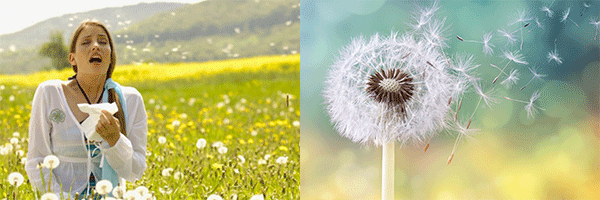12 Jun

17500 Views
Information about Spring Allergy
With the arrival of spring in our country, the incidence of allergic diseases will start to increase. There are many people who are affected by the pollen produced by trees, flowers and grasses, especially with the greening of nature. In people with allergic constitution, pollen entering the body causes the secretion of certain substances. This causes the capillaries in the eye and nasal membranes to dilate and swell the tissues. As a result, spring allergy occurs. This is also commonly called "hay fever". Allergy is an exaggerated response of the human body to substances that are not normally harmful. This exaggerated response can sometimes occur throughout the body, sometimes in one part of the body.
Allergy is a very common disease. Especially genetic predisposition and environmental factors play an important role in the onset of allergy. The immune system normally protects the human body against bacteria, viruses and harmful substances. If the immune system responds exaggeratedly to substances that are not normally harmful, this is called allergy. The immune system of allergic people is hypersensitive to certain substances. When faced with these sensitive substances, the immune system goes out of control and allergic symptoms such as itching, redness, swelling, spasm, tearing and runny nose occur. The most common allergens are pollen, mold, animal dander, house dust, food and medicines. The immune system is a complex system that forms the defense mechanism against diseases, recognizes and destroys pathogens and tumor cells, and protects the body from foreign and harmful substances. It is a defense shield that protects the body against diseases.
Symptoms of runny nose, nasal congestion, watery eyes and sneezing that occur in spring are called spring allergy or seasonal allergic rhinitis. Pollen from trees and grasses are the most triggering factors of spring allergy. From the air, pollen sticks to our nose, eyes and throat. Symptoms of an allergic reaction then occur. Symptoms of spring allergy include the following; nasal congestion, sneezing attacks, runny nose, itching in the nose and eyes, pressure in the sinuses and pain in the face, swelling under the eyes, decreased sense of smell and taste, fatigue, perception difficulties, sleep disturbance, itching in the palate and throat, cough and headache are possible symptoms.
Allergic rhinitis (spring allergy) can be seen at any age. The most common age of onset is the years of transition from childhood to adulthood. Nearly fifty percent of patients have a positive family history. Among the conditions that increase the occurrence of spring allergy in a person; having allergies or atopic conditions in the family, having pets at home, smoking at home, air pollution, black race and switching to artificial formulas in infants before the age of one year are factors that increase the occurrence of spring allergy.
People with spring allergy should definitely consult a doctor, especially during periods when they experience high levels of distress. Medicines or sprays prescribed by your doctor should be used. In order to keep the immune system strong, attention should be paid to a balanced diet. Drink plenty of water and rest when necessary. Alcohol and smoking should be avoided. If the person experiences allergy symptoms for at least two seasons or six times a year, "immunotherapy vaccine" should be administered. This vaccine can be administered to people who cannot be controlled with medication or who have side effects to medication. Of course, it is the person's own physician who will decide on this.
As for the ways to prevent spring allergy; the first important step in allergy is which pollen the person reacts to. The way to find out is through an allergy test. The time interval when pollen is at its highest level is from morning to noon. Pollen density also decreases after it rains and in the evening. In order to minimize allergies, do not go out in the morning, in dry and windy weather, unless absolutely necessary. Prefer indoor areas for sports. If your eyes are affected, wear sunglasses. Change your clothes when you get home. Take a shower and wash your face with plenty of water. Do not neglect your medical check-ups and use the medication prescribed by your doctor. If you are at home, do not open windows and doors during peak pollen hours. Do not stay too long in an environment where the grass is mowed. Do not lie down on the grass. Smoking can increase the level of your allergy. Therefore, do not smoke and avoid being in smoking environments. Wear a protective mask when pollen levels are high.
We wish you a healthy day...



Leave a Comment